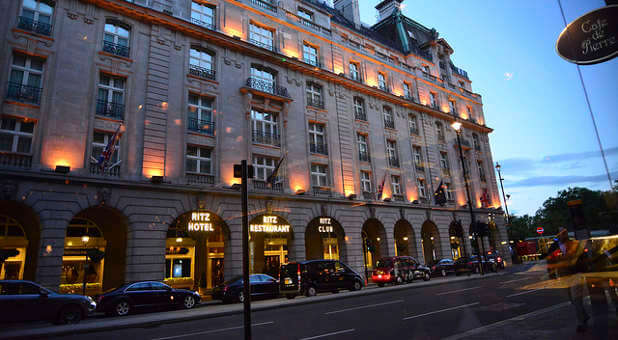So far, this has been a tremendous trip to London. As I wrote on Tuesday, I had the opportunity to present a copy of the Modern English Version to Her Majesty Queen Elizabeth II at Windsor Castle on Sunday via the Dean of Windsor, the Right Rev. David Conner, who she asked to receive it on her behalf.
One of the trip’s highlights to me happened the next day, Monday. It was a high tea at the famous Ritz Hotel in London, hosted by my friends Martin and Shaneen Clarke.
Martin is a successful London businessman, and his wife is a gifted speaker and philanthropist who ministers around the world.
Martin is so well known in the U.K.; he was the one who made connections that resulted in the Bible being presented to Queen Elizabeth.
It was his idea to host a tea to celebrate the presentation at the Ritz. I’d heard of the hotel but had never been there. It exceeded expectations. It was elegant beyond description. The high tea itself was very formal with the little crustless sandwiches, creative tiny candies and cakes and, of course, English tea.
The 40 guests were served in the ornate, completely mirrored Marie Antoinette room and entertained with a soprano and pianist.
My part of the program was to give remarks about my personal connection to a famous English Bible translator named John Rogers, whom I’ve written about previously.
On Monday, I told the guests what I’ve researched. John Rogers lived in the early 1500s and carried on the work of William Tyndale after he was burned at the stake in 1539. Rogers did so under the pseudonym Thomas Matthews, which had also been used by Tyndale. There were four editions, and it’s also called both the Thomas Matthews Bible and sometimes the Tyndale-Matthews Bible. It was printed in Antwerp, Belgium, and I have a single page from the first and fourth editions framed as artwork in my office in Florida.
In those days it was dangerous to translate the Bible. Like Tyndale, Rogers paid for it with his life. He was burned at the stake on Feb. 4, 1555, in Smithfield in London. To give perspective, that was 10 years before the Spanish founded St. Augustine, the oldest city in North America, and 65 years before the Pilgrims landed at Plymouth Rock in the new colony of Massachusetts.
This is significant to me because I believe I’m a direct descendant of John Rogers. I learned of this in 1994 when I attended my grandmother’s funeral and met one of her cousins, the family historian, who gave me a copy of a typewritten family history. I read that my seventh great-grandfather, James Rogers, claimed to be the great-grandson of John Rogers the Martyr, but there was no proof. However, this family history said his children firmly believed the story to be true.
I had never heard of John Rogers the Martyr. I researched him and learned what I am writing here. I accepted the family tradition to be true, thinking these people had no reason to lie in a private family history.
As I researched John Rogers’ life, I discovered he was in the original book, Foxe’s Book of Martyrs. It said he had 10 children who, along with his wife, followed him to his death begging him to recant in order to save his life. His son, Bernard, my ancestor, was only 12 at the time.
I told the gathering at the high tea about my passion for the Word of God and that it had been a dream of mine to publish the Bible. We had already published some specialty topical Bibles, using other translations, with names like the Holy Spirit Encounter Bible and the Spiritual Warfare Bible.
Then, around 2009, we learned we could obtain the publishing rights to this new update of the King James Version—the translation with which I grew up.
We thoroughly investigated this new translation, which was then called KJV2011. We leaned that the 47 translators had high credentials, yet they all shared a believing faith in Jesus. For their translation, they went back to the Ben Chayyim text in Hebrew and the Textus Receptus in Greek, which were the same documents used by the translators of the King James Version. They made a word-for-word translation as much as possible and tried to keep the King James wording and cadence where they felt the wording was still modern English.
Remember that the King James Version was modern English for its day. Someone said if the King James Version was translated today it would be the Modern English Version!
My company, Charisma Media, did not do the translation. It was done by the Military Bible Association and was to have been distributed mainly through chaplains in the U.K. and America to servicemen and women. We discovered it was an unusually good translation at a time when many Christians were wanting a literal translation instead of some of the modern paraphrases (or thought-for-thought translations), which often interjected a certain amount of political correctness into the text and changed the meaning (no matter how slightly) of what the original text said.
At the tea, I thanked not only the Clarkes but also their friend, Col. David Waddell, who I found to be a true English gentleman and who made the connection to the Dean of Windsor for us. I also thanked the Dean’s personal secretary, Anna Leon, for handling the endless details to make this brief presentation at Windsor take place.
Later this week I will write about the Empowered21 event I’m attending here in England.
You can also follow my trip on my Facebook page under my name, Steve Strang.











































